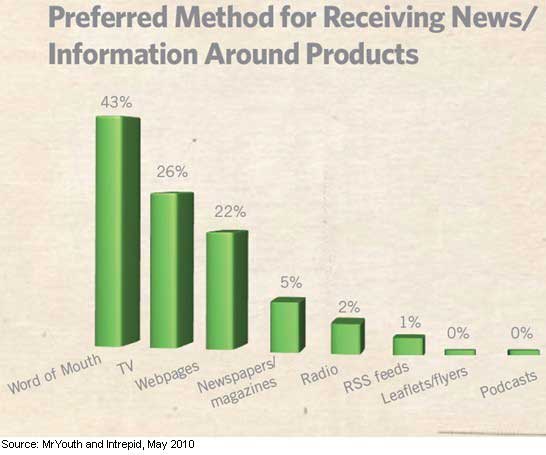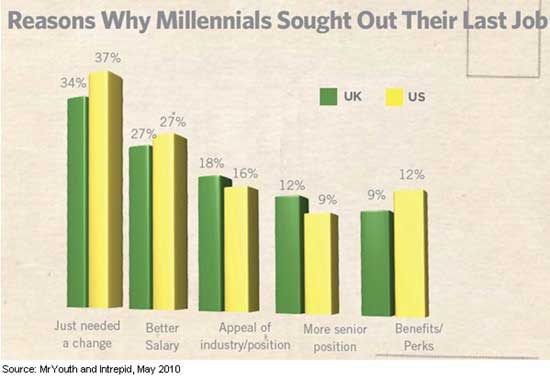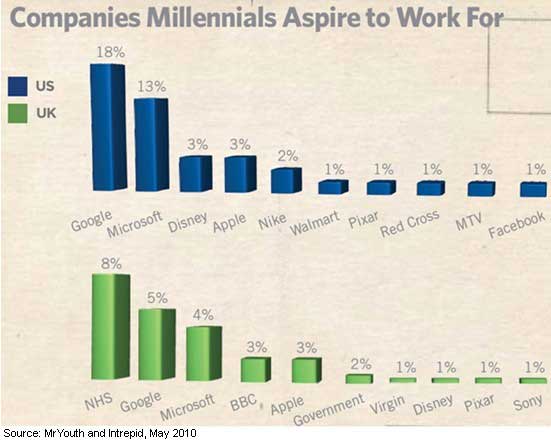Millennials are hard to sway using traditional advertising and media channels that don't promote interaction: Only 17.7% say their favorite TV spot has led them to purchase an advertised product, while nearly one-half (48%) say that word-of-mouth communications influence them more than TV advertisements, according to a study from Mr Youth and Intrepid.
Accustomed to innately consuming, creating, and participating in media, Millennials are easily turned off by one-way communications and brands that don't deeply interact with them, the study finds.
Word-of-Mouth Trusted to Inform
Thanks to their friends on Facebook and Twitter—as well as peer product reviews—Millennials surveyed prefer word-of-mouth as a source of news and information about products (43%) over TV (26%) and Web pages (22%).

"Millennials clearly have a different view on business, marketing, and communication, much of which stems from being immersed in social technologies from a fairly young age," said Brandon Evans, managing partner and chief strategy officer of Mr Youth.
"These strong differences in attitudes and behaviors are still very underrepresented in how most companies approach their consumers."
Below, other findings from the study Millennial Inc, which explores Millennials' views on business, marketing, and communications.
Collaboratively Led Enterprises
In professional environments, Millennials value expertise across areas of responsibility: 82% say it is important to have a staff that can do each other's jobs and 54% prefer decisions made by consensus.
Sometimes dubbed the ADD Generation, Millennials are often searching for work that keeps their attention: 37% of Millennials cited the need for a change as the reason they sought out their last job, followed by the desire for a better salary (27%) and appeal of the industry/position (16%).

Moreover, by age 26, Millennials have changed their jobs an average of seven times (since age 18).
Looking for real, hard data that can help you match social media tools and tactics to your marketing goals? The State of Social Media Marketing, a 240-page original research report from MarketingProfs, gives you the inside scoop on how 5,140 marketing pros are using social media to create winning campaigns, measure ROI, and reach audiences in new and exciting ways.
Innovation-Driven Culture
In addition to selecting "fun" and "friendly," Millennials identify "challenging" as the key component of a good work environment.
Google (18%) and Microsoft (13%) lead the list of companies that Millennials in the US aspire to work for. In the UK, the National Health Service (8%) is No. 1, followed by Google (5%) and Microsoft (4%).

Overall, Google and Microsoft, along with Apple and Nike, are viewed as innovators both for their products and their corporate approaches. Technology and innovation have the same allure that previous generations attributed to fashion and celebrity, the study finds.
Other findings:
- Quality evokes love: Although Apple, Sony, and Nike all make stylish and innovative products, they are Millennials' favorite brands because they have become synonymous with quality. In describing the brands that Millennials love, quality was the No. 1 trait cited. Only 11% of Millennials disagree that they would not spend more for items that they know would last.
- Eco awareness, but not concern: Millennials may be concerned with the effects their lifestyle has on the environment, but that concern doesn't drive their day-to-day actions: Only 20% say they are concerned about the effect their lifestyle has on the environment, while 50% are neutral and 30% say they are not concerned at all.
- Role models: Although most Millennials (60%) view the use of celebrities directly in advertisements as taboo, the characters they play fare significantly better: 70% say they identify with the characters celebrities play, rather than the celebrities themselves.
About the data: Findings are from the study Millennial Inc, by Mr Youth and Intrepid, conducted over a six-month period ended April 2010. The study includes a quantitative survey of 2,000 young adults in the US and UK, a digital ethnography (organically built online community), and the creation of virtual businesses (two groups of Millennials, one in the US and one in the UK, tasked with developing a "business of tomorrow").



